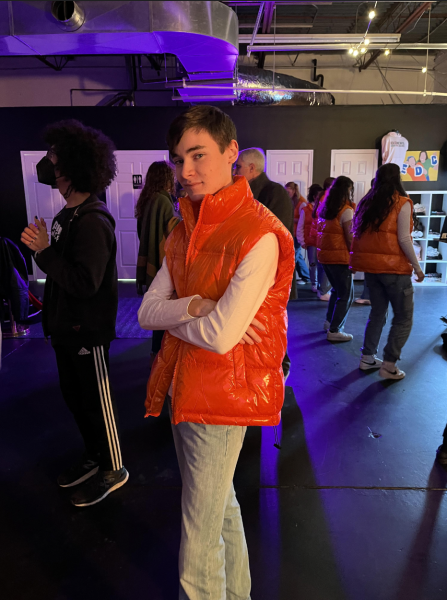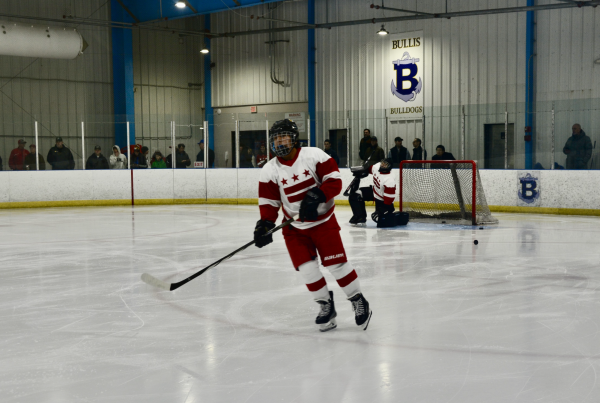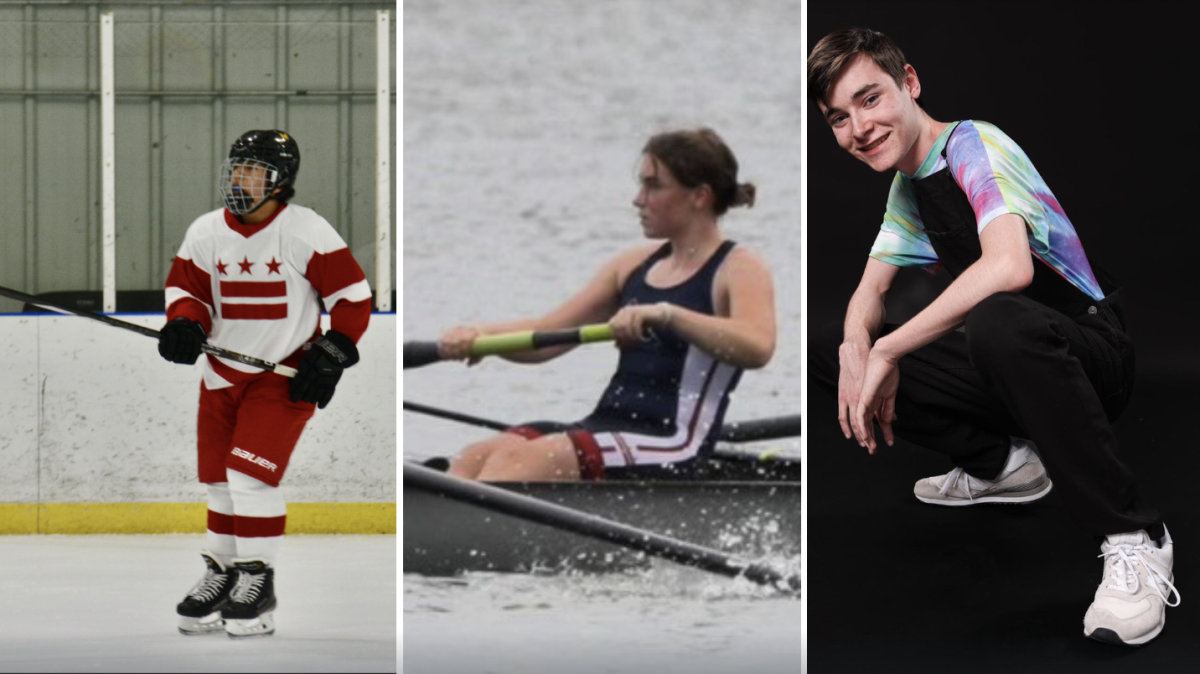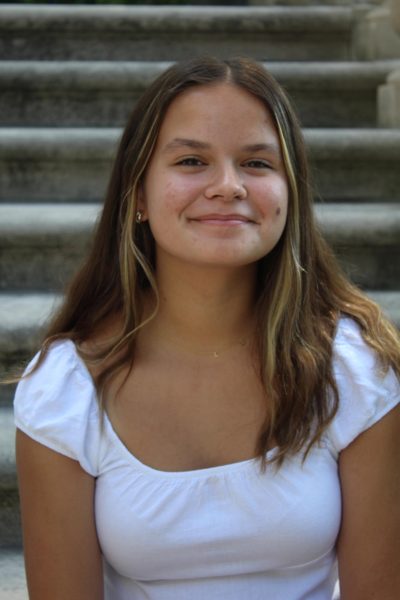The Upper School Athletic Ceremony on Dec. 14 brought immense excitement to the upper school’s student-athletes. While athletes all around Tregaron anxiously wondered if their name would be called for an award, sophomore Abigail Dauchy did not share this thrill, as she knew her name could never be called. Like many students at WIS, she plays a sport the school does not offer.
Before rowing, Dauchy didn’t participate in any sports, but a friend convinced her to give rowing a try. Now, Dauchy has been rowing at Thompson Boat Center Racing (TBC), located in Georgetown, for two and a half years.
“I also live close [to the river] and was curious,” Dauchy said. “At first I didn’t like it too much, I just kind of did it on the side. Then [summer] began and I had to do it morning and night every day, which helped me get into it.”
Her passion grew especially in freshman year, when she became more involved in the sport. “It got really fun because of all the deeper [friendships] I made and everything, as well as me getting better in the sport,” Dauchy said.

Sophomore Patrick Kaufmann plays hockey at D.C. Stars, a team for high schoolers from schools without hockey teams. He has been playing hockey for eight years, which has been largely influenced by his family.
“My dad grew up in Canada and introduced me to the sport,” Kaufmann said. “[Hockey] has led me to understand the true value of hard work and [how to] apply it to school and life in general,” Kauffman said.
Senior Henri Greamo is a hip-hop dancer and has been dancing for almost 12 years. He started the sport early on. “I took a dance class at my pre-school when I was five years old,” Greamo said. “I enjoyed it so much that the dance teacher suggested I start taking real lessons.”
Being an athlete outside of school means having to balance schoolwork as well as athletics which can be quite a struggle. “Because the practices and the games are not on campus, it makes it challenging to go to some of the games that are really far away,” Kaufmann said. Kaufmann also explained the challenge of ice rink availability, which is more limited than other sports, making practices run very late.
Dauchy feels similarly. Along with time balance, because her sport is less popular at WIS, she also has to explain her sport to teachers often. “They don’t [know] how much time goes into regattas and practices,” Dauchy said. “It can be a lot, always having to explain it to them.” A regatta is an event of multiple rowing races.
For Greamo, dance is a lighter commitment during the week. Still, rehearsals typically run long on weekends. “There have definitely been stressful weekends where I would have rehearsal all day and have to come back home late at night and finish schoolwork,” Greamo said.
Throughout playing sports outside of WIS, Greamo has had better luck with teacher’s understanding of his sport and his missing classes for dance. “My teacher[s] would understand if I had to turn in an assignment late or reschedule a test,” Greamo said.

WIS has a strong team culture, which can build friendships and memories. Additionally, students and teachers are often very supportive of the athletes, congratulating them or wishing them luck. However, athletes not experiencing it can feel left out.
“There’s always a team at WIS, but there is no team for me,” Dauchy said.
Dauchy says she sometimes feels upset when she sees the bonds that she cannot make at school.
“Sometimes [I] wish I could do a sport at WIS because then I would have more connections with people at [here],” she said. “I see how all of my friends and everyone knows each other because of soccer or tennis or volleyball.”
Similarly, Kaufmann feels he is missing part of the high school experience by not having his friends and teachers see him play.
“It’s sad not having school support at [my games],” Kaufmann said.

He also expressed that it is especially difficult since many of his teammates have a different experience.
“Most of the other private schools in the DMV have lots of spirit for hockey,” Kaufmann said. It is a challenge to see school spirit from other schools but not his own.
Greamo, on the other hand, has had a different experience. He recognizes his sport is less popular, which makes him feel less excluded. “I feel left out to an extent,” Greamo said. “But at the same time, my sport is quite niche and so I’ve grown used to hip-hop dance only being represented in specific [communities].”
Feeling left out can be difficult to deal with, especially when other schools offer many of these sports.
“I had considered going to another school that had an established hockey team,” Kaufmann said. However, he stayed at WIS because of the community.
“I decided to stay because I like all my teachers and would miss my friends a lot if I left,” Kaufmann said.
Dauchy and Greamo, however, have not had these thoughts. Dauchy’s club gives her plenty of opportunities that allow her to develop as a rower, even if she can’t do it at school. Additionally, Greamo explained that dancing outside of school is enough to not make him leave WIS.
“I would never leave just because they don’t have a sport that I can just do outside of school,” Greamo said.
While these student-athletes have faced many challenges, their sports have brought them joy and new experiences. All three athletes agreed that their sport allowed them to experience a life separate from school. Kaufmann and Dauchy especially emphasized their new friends and people they would have never met if it weren’t for their sports.
“Playing a sport outside of school helped me to meet new people and create new friend groups,” Kaufmann said.
Through making new friends, Greamo expressed the benefits of knowing people who share his passion, even if they don’t go to school with him. “The people that I can dance [and bond] with over that shared passion are outside of WIS, and I don’t necessarily think that’s a bad thing,” Greamo said.
Although WIS does not provide every sport, the student body represents a variety of other sports that peers and teachers may be unaware of.
“I wish that people would know that I’m achieving something outside of school,” Dauchy said.
By Lucy Randall and Cate Taylor




































































